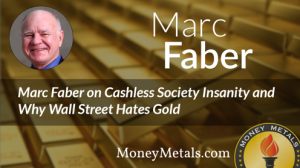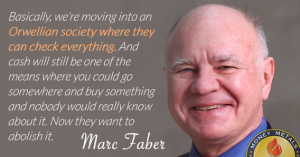
Mike Gleason: It is my privilege now to be joined by a man who needs little introduction, Marc Faber; editor and publisher of The Gloom, Boom & Doom Report. Dr. Faber has frequently appeared on financial shows across the globe and he’s a well-known Austrian school economist, and an investment adviser. It’s a real honor to have him on with us today. Dr. Faber, thank you so much for joining us.
Marc Faber: It’s my pleasure, thank you very much.
Mike Gleason: Well, I want to start out by asking you about the current state of the financial world here in the early part of 2016. We’ve got the global equities markets continuing to roll over. Meanwhile, the metals are doing quite well and acting as a bit of a safe haven. What do you make of the market action here, so far this year?
Marc Faber: Well, basically, the financial markets have been sick for quite some time. Emerging markets either never made a new high above the 2006, 2007 highs, or they peaked out in 2011, or some even later in 2014. Basically after about February/March 2015, they started to drift. And in the U.S., the indices were strong, but the average stock was down substantially in 2015. This is called weakness beneath the surface of the indices because an index, theoretically, could have 500 stocks and 499 decline, but one stock goes up a lot and drives up the index. So this happened last year, to some extent, in the U.S… you have the strong stocks, Facebook, Amazon, Netflix, Google, and maybe another 20 stocks that were going up. And at the same time, you have thousands of stocks that were acting badly and going down, which accounts for actually a horrible performance for most investors. Now in January, reality set in with the strong stocks, they’re all down 20, 30, and sometimes even more percentages.
Mike Gleason: Gold has been rallying in dollar terms lately but it has done much better in terms of many other major fiat currencies. The U.S. dollar has been remarkably strong in the past year, although it’s finally showing some signs of weakness. What are you expecting over the coming year in the currency markets? Is the dollar going to head higher still or do you see it rolling over?
Marc Faber: The question should be, “Which central bank is the most insane?” Because you understand, the central banks have been manipulating just about everything. They manipulate the currencies, they manipulate interest rates, they manipulate stocks. It’s interesting sometimes if you observe in the U.S., when the market is very weak overnight, in other words the S&P futures go down 20, 30 points, suddenly, a buyer emerges and pushes up the market. I believe that the Fed has not just intervened in bonds through Operation Twist, in interest rates through QE programs but occasionally they step into the stock market to stabilize the market and try to push it up. I think other central banks around the world … in Japan, they announce it, the central bank, the Bank of Japan, is buying shares through ETFs.
So there’s a gigantic manipulation and you and I, as an investor, we just don’t know how far these insane people will go with the manipulation of markets. Now, already 7 trillion dollars’ worth of pounds are trading at less than 0 interest. The talk is that, even in the U.S., they might introduce negative interest rates. Negative interest rates will not help the world; I guarantee you that.
Mike Gleason: Furthering the point there, let’s talk about the war on cash for a moment. We have negative interest rates coming into the picture, as you just mentioned, with our own Fed telling U.S. banks to start thinking about how they would handle negative rates. Meanwhile, we’re seeing people who want to deal in cash, withdraw their cash, even deposit cash, getting hassled in various ways. Why do you personally think that cash and cash holders are increasingly disfavored by the financial establishment?
Marc Faber: Well, it’s clear to me. If you look at the world over the last 100 years, you have a group of people that want to have more and more control over you and me. They want to know where you are, what you do, what you’re looking at. Basically, we’re moving into an Orwellian society where they can check everything. And cash will still be one of the means where you could go somewhere and buy something and nobody would really know about it. Now they want to abolish it. Of course, if you have negative interest rates, you want to essentially prevent people from hoarding bank notes in their safes at no cost. So you want to deprive them of that privilege, of that freedom, so you introduce a cashless society. In my opinion, it will not work, and let me explain to you why.

Let’s say you and I live in a small town of a thousand people and suddenly the government says, “No more cash.” Say, I’m the baker and you’re the butcher, and a friend of ours is the pharmacist. We can then barter among each other and effect the balances every month or every 3 months and so forth. Then, some kind of paper money comes back up. These are vouchers. So the war on cash would have the exact opposite effect. You will have a voucher system in every small city, and even in big cities, some smart people will develop the voucher system. So instead of having just one currency, paper currency, you’ll have hundreds of paper currencies. Number two; if they want to really launch a cashless society, they would have to take your gold away. That, in some countries, will simply not fly. In other countries, a cashless society is simply not practical because 80% of the population doesn’t have a bank account and doesn’t have cash to start with. So in my view, this cashless business is going to fail very badly.













Leave A Comment